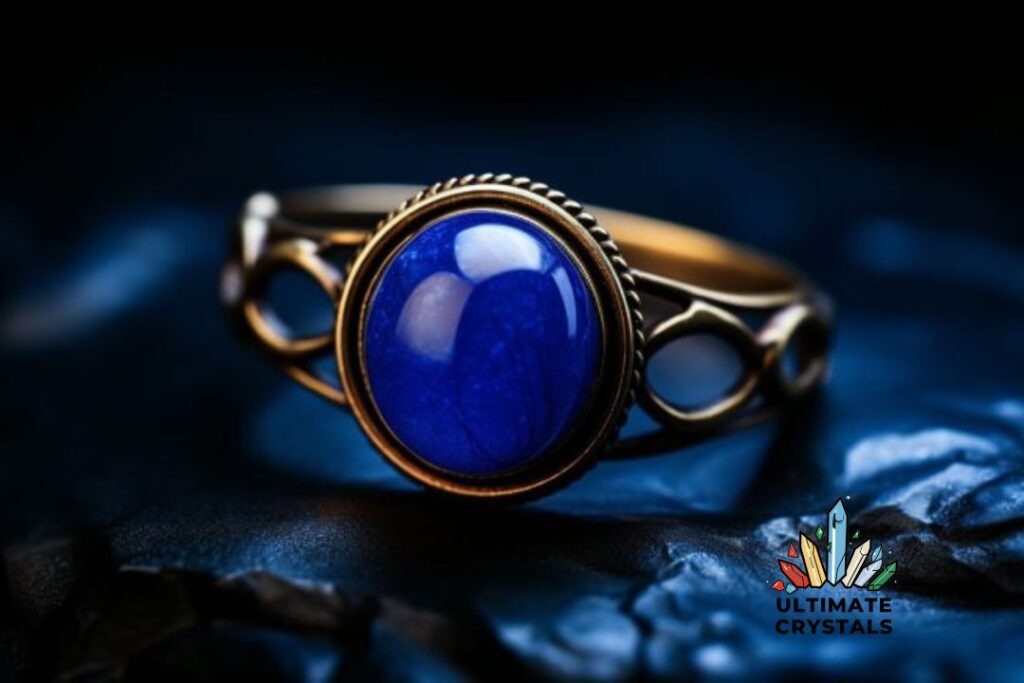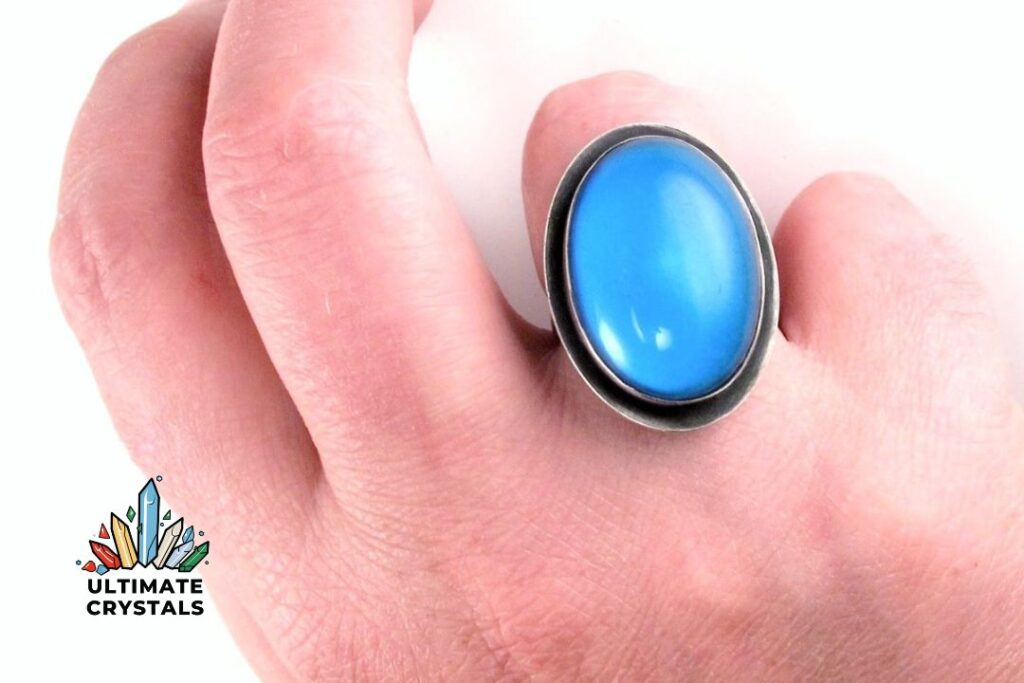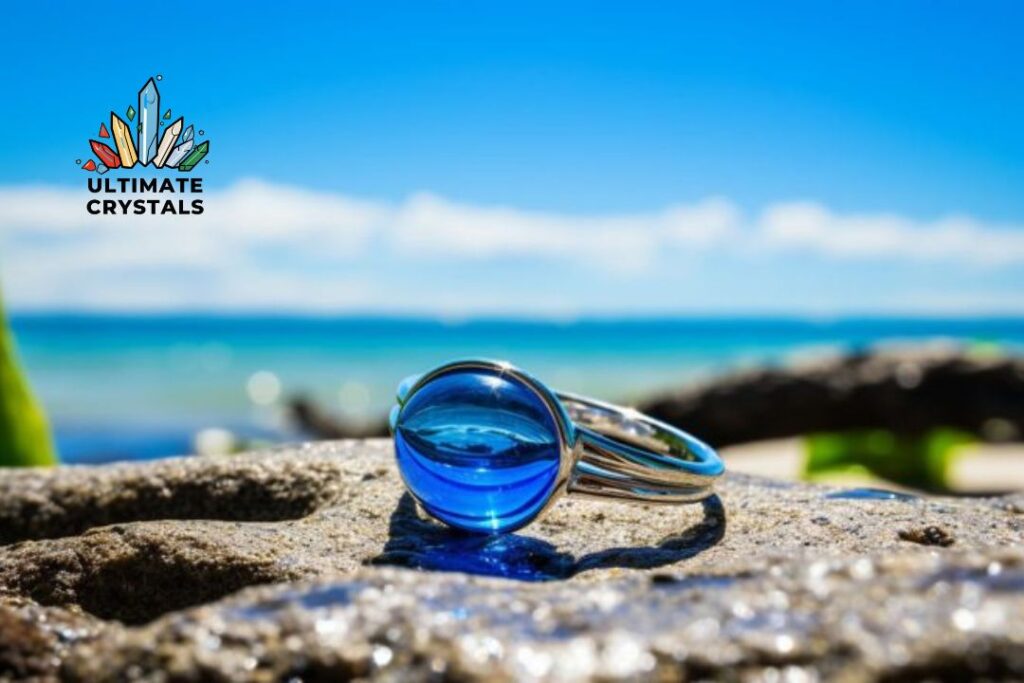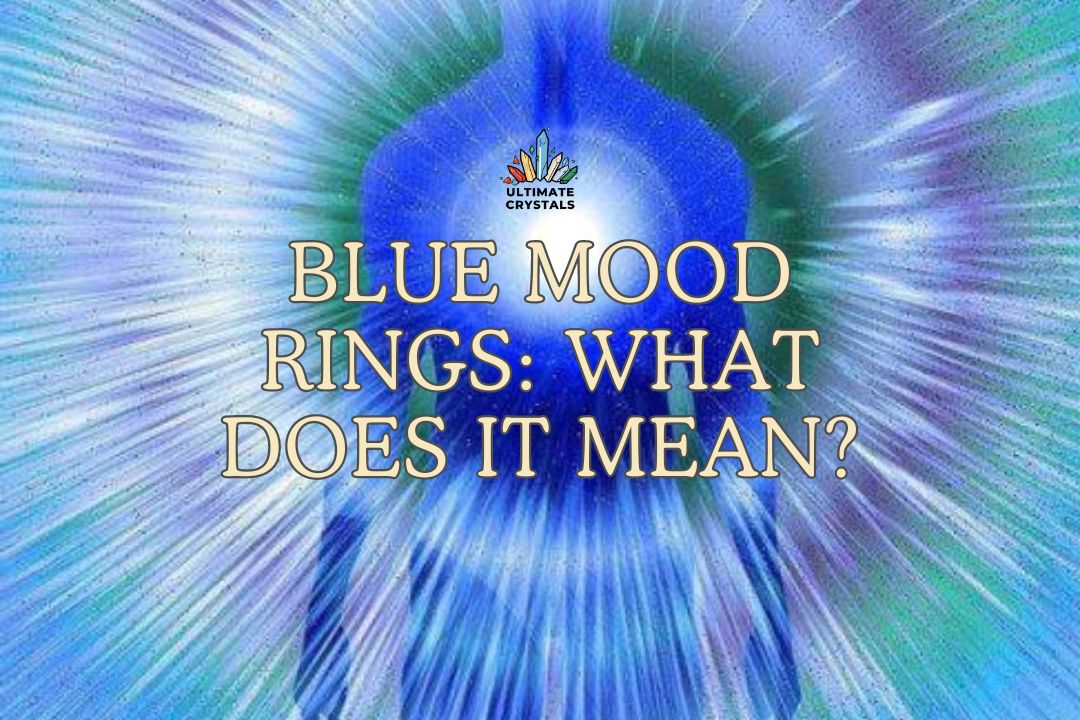Have you ever wondered what your mood ring is trying to tell you? Blue Mood ring have become a popular accessory, and for good reason. They can give us an insight into our mental and emotional states. In this blog, we will be diving deeper into the concept of mood rings. From the science behind them to how they work, we will cover it all. We’ll then focus on one specific color – blue. What does a blue mood ring indicate? We’ll answer that question in detail. Lastly, we will also discuss any possible side effects of wearing a blue mood ring. So sit tight and get ready to learn something new about this trendy accessory!
Understanding the Concept of Mood Rings

Mood rings are crafted with a special thermochromic liquid crystal that responds to changes in body temperature, causing a shift in color. These rings gained popularity in the 1970s as a unique way to reflect the wearer’s mood through color changes. By utilizing quartz jewelry and liquid crystals, mood rings react to the body’s temperature variations, resulting in the display of different colors. The liquid crystal inside the ring is responsive to the wearer’s body temperature, leading to the captivating color change that signifies a shift in mood. Each mood ring is embedded with beads of liquid crystal, offering wearers a sense of tranquility or relaxation based on the color variations.
The Role of Body Temperature in Changing Colors
- Mood rings operate using thermochromic liquid crystals, which change color when there are temperature variations.
- The liquid crystal within the mood ring undergoes a shift as the body temperature of the wearer fluctuates, resulting in a change of color.
- Mood rings utilize liquid crystals such as serenity, violet, quartz, and moisture to reflect various moods.
- Liquid crystals allow mood rings to exhibit different hues based on body temperature, as mentioned in a wall street journal.
- Mood rings were initially designed in the 1970s and use a thermochromic liquid crystal that responds to body temperature, allowing for captivating color changes that wearers experience.
What Are Mood Rings Made Of?

Mood rings are typically crafted from sterling silver, a durable and lustrous material commonly used in jewelry. These rings incorporate liquid crystals that change color based on body temperature, indicating emotions such as serenity, relaxation, violet, quartz, and moisture. Developed in the 1970s, mood rings utilize smectic phase liquid crystals to display different colors as the wearer’s temperature fluctuates.
How Does a Mood Ring Work?
Mood rings work by using a thermochromic liquid crystal that changes color based on body temperature. This liquid crystal reacts to the heat from your skin and causes the ring to change colors, indicating different moods. First created in the 1970s, mood rings rely on nematic phase liquid crystals to create their unique color-changing effect.
Color Depends on Temperature
- Mood rings are crafted with a special thermochromic liquid crystal that reacts to the body’s temperature, causing the ring to change color.
- This color-changing phenomenon reflects different moods and emotions associated with the varying body temperatures.
- When the body is at rest or in a state of calmness, the ring may exhibit a serene light blue color, symbolizing tranquility and relaxation.
- Conversely, as the body temperature fluctuates, the mood ring may transition to a deeper, dark blue shade, indicating a shift in the wearer’s mood.
- Originally introduced in the 1970s, modern mood rings continue to captivate ring buyers with their ability to convey emotions through color.
- These innovative pieces of mood jewelry were first envisioned by New York inventors Maris Ambats and Josh Reynolds, revolutionizing the concept of wearable emotional expression.
- By leveraging the principles of thermochromism and liquid crystal technology, the first mood ring offered wearers a unique way to visually represent their internal emotional states, making them an enduring and beloved accessory.
Significance and Interpretation of Blue Mood Ring

The light blue mood ring signifies a mood of tranquility and calmness, reflecting a sense of relaxation and inner serenity. This modern mood jewelry uses different shades of blue to represent various emotional states, with darker shades indicating deeper levels of relaxation. Unlike the first blue mood ring introduced in the 1970s, which used a limited color spectrum to depict emotions, new york inventors Maris Ambats developed modern blue mood ring that incorporated a wider range of colors, including amber and violet, to more accurately reflect the wearer’s mood based on body temperature fluctuations.
Wearing a blue mood ring not only acts as a stylish accessory but also serves as a visual indicator of the wearer’s emotional state. The significance of the blue color in mood rings lies in its ability to subtly communicate feelings of peace and tranquility, offering a unique way for ring buyers to express their mood without words. As the temperature changes, the blue hue of the mood ring shifts, providing a constant visual representation of the wearer’s emotional well-being.
What Does a Blue Mood Ring Indicate?
Blue mood ring indicate a sense of relaxation and serenity, reflecting different moods based on body temperature. The blue color represents a calming mood and suggests a state of tranquility. Wearing a blue mood ring allows you to express your emotions through its changing hues.
Wearing a blue mood ring is generally safe, as it simply changes color based on body temperature to reflect different moods. There are no known side effects associated with wearing a blue mood ring.
Frequently Asked Questions
Do mood rings actually work?
Mood rings use thermochromic materials that react to body temperature, causing them to change color. While they may not have scientific validity, some believe mood rings can reflect emotional states. The interpretation of colors associated with emotions can vary, making their effectiveness subjective.
Why did my mood ring turn blue?
The blue color in your mood ring indicates a calm and relaxed state of mind. It changes color based on temperature-sensitive liquid crystals that reflect different wavelengths of light. Factors like body temperature, stress levels, and physical activity can affect the color change.
Why is my mood ring black?
A black mood ring color signifies a malfunction. These rings reflect body temperature changes, which correspond to different colors. If your mood ring remains consistently black, try adjusting the fit or wearing it for a longer period. If the issue persists, consider replacing the ring.
What emotions does the color blue signify on a mood ring?
Blue on a mood ring can represent calmness, relaxation, and peace. It can also indicate sadness or feeling down. The shade of blue can impact the meaning, with lighter shades representing tranquility and darker shades signifying deeper emotions. Remember, mood rings are not scientifically accurate for emotional guidance.
Why can people feel ‘blue’ but not red or green?
“Feeling blue” is a common expression for sadness, while red and green are not typically associated with specific emotions. The color blue has long been linked to sadness in art and literature, but other colors can evoke different emotions, such as red for anger and green for envy.
Can the meaning of a mood ring vary depending on the shade of blue?
The meaning of a mood ring can indeed vary depending on the shade of blue. Lighter shades generally signify calmness and relaxation, while darker shades may indicate feelings of sadness or anxiety. However, it’s important to note that the interpretation of a mood ring’s colors is subjective and can vary between individuals.
Conclusion and final thoughts
To conclude, wearing a blue mood ring can symbolize calmness, tranquility, and relaxation. Blue is often associated with a sense of peace and serenity. It is believed to promote a sense of balance and harmony, making it an ideal color for those looking to reduce stress and anxiety. However, it’s important to note that the interpretation of colors in mood rings can vary from person to person, and it’s not a scientifically proven method of assessing one’s mood or emotions. If you experience any negative side effects or discomfort while wearing a mood ring, it’s best to remove it and consult a healthcare professional if necessary.
You may also like

